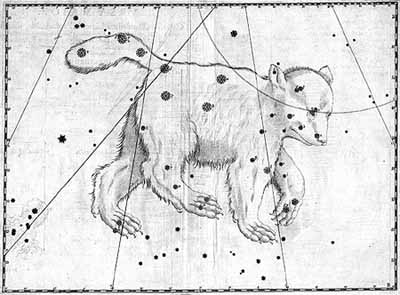Ursa Major: The Oldest Story in the World
Since at least the early 1900s it has been recognized that there is a curious similarity between Eurasian and North American myths associated with the seven major stars of what is generally referred to as The Big Dipper. The most common motif involves a bear, which is of course the theme of Ursa Major, “The Great Bear”, the constellation of which the Big Dipper makes up the most significant portion.

Ursa Major
In all likelihood, the story derives from a common source in Asia that spread through migration across the Bering land bridge. This is a rather staggering conclusion. If the linguistic and genetic trees derived by L.L. Cavalli-Sforza can act as a guide, the common ancestor of this myth may go back well over 20,000 years.
Its stars seem to have been called the Bear over nearly the whole of our continent when the first Europeans, of whom we have knowledge, arrived. They were known as far north as Point Barrow, as far east as Nova Scotia, as far west as the Pacific Coast, and as far south as the Pueblos.
- Stansbury Hagar, “The Celestial Bear”, The Journal of American Folklore (JAF), Apr.-Jun., 1900
Occasional local names notwithstanding, the possibility of the bear as Ursa Major having originated independently is inconceivable. Classical Old World mythology is replete with the bear in its role as Ursa Major. Ancient Greek, Hebrew, and Arabic all contain references to this motif.
- William B. Gibbon, “Asiatic Parallels in North American Star Lore: Ursa Major”, JAF, Jul.-Sep., 1964.
The power of the bear motif can be seen in the very word “bear” itself, which is derived from an Old Germanic word meaning “the brown one.”
Linguists hypothesize that in old common Germanic, the true name of the bear was under a taboo — not to be spoken directly. The exact details of the taboo are not known. Did it apply to hunters who were hunting the bear and did not want to warn it? Or to hunters hunting other animals and did not wanting to rile up the bear and have it steal their prey? Or did it apply to anyone who did not want to summon the bear by its name and perhaps become its prey? Whatever the details, the taboo worked so well that no trace of the original *rkto- word remains in Germanic languages, except as borrowed historically in learned words from Greek or Latin.



i think you should tell people the question that they asked like how did the star get its name!!!
» Posted by none of your buisness on April 1, 2008 06:44 PM